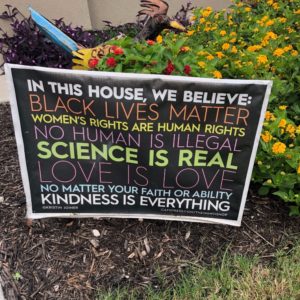When there are no words

Photo by me, sign from our front yard
Over the last few days, I’ve struggled, as many have, with the effort to find words to say. Nothing I’ve come up with has seemed helpful, meaningful, or even close to expressing all that I feel right now. And so instead today’s newsletter is my effort to amplify the work of many of my friends and colleagues who have found the words and who are and have been doing amazing and important work. I’m honored to know and to have learned from each of them.
I also want to tell you a story. It’s not my story, but I have permission to share it. It’s the story of someone I have been working with as her coach for the past six months. A relatively new director of a large, complex department, she has coped with major turnover, union grievances regarding changes she has made, and of course, moving all of their operations to multiple remote locations. She and her colleagues are in an office that can’t stop just because the world around them has gotten complicated. Their service to students is critical. And now many of her staff live in or near areas affected by the protests and their violent aftermath.
Monday, she took the risk of inviting her colleagues to gather via Zoom. She acknowledged their pain, their good work, and created a space for them to come together. She shared a resource with them. https://advice.shinetext.com/articles/12-ways-you-can-be-an-activist-without-going-to-a-protest/?fbclid=IwAR1X6cS0-Rdbn80CygQEREg2aPoIQzbX9yo2NoWKUKFQm45ZKKwIrH7fHUk
She invited people to talk. And then she did one of the most important and difficult things a leader can do especially in challenging times. She quit talking. She was ready to listen. She held the silence for a full eight minutes.
No one chose to speak. As she put it, everyone was sitting there like they were holding a heavy bag; some people were crying. She closed by acknowledging that sometimes the best we can do is sit together in uncomfortable silence. She acknowledged and thanked them for the challenging work they are doing, often with unhappy students, families, and other staff while affirming that students still needed their best work. She voiced the heartache, sorrow, and fear many were feeling. And she offered them help by asking them to let her know if they were struggling in their work and she would try to find ways to give them a break.
Not everyone came, but those who did were appreciative. It was a risk because there’s always the potential for conversations to become hurtful when emotions are running high and her office dynamics have been challenging. But she did what leaders are supposed to do – she acknowledged this was a time to stop. It’s not business as usual. She treated them as people deserving of respect, affirmed their worth, and reminded them of the importance of the work they are doing.
I know each of us must find our own way through the challenges we are facing and each of us come to this time with ‘heavy bags’ of differing size, history, and weight. But I also know that our ability to treat each other as people deserving of respect is a hallmark of our work and that each of you will keep doing that work no matter how challenging the circumstances. Know I’m here to support each of you. I am willing and glad to sit with you to create a safe and confidential space to share your heartache or to problem-solve as needed.
Take care,
Gage
Powerful Voices
From Mamta Accapadi, Ph. D, Vice President for Student Affairs at Rollins College, Alumna of The University of Texas at Austin, a call for “deep, enduring empathy.”
From Sue Borrego, Ph. D., Professor and former Chancellor at the University of Michigan – Flint a story of her efforts in “Understanding My Privilege” in this TEDx Talk at TEDxPasadenaWomen.
https://www.youtube.com/watch?v=XlRxqC0Sze4
For anyone looking for more diversity in books to share with children, let me suggest you pre-order one or both of these books. Both authors are amazing voices of love as they challenge us to be better. I have no doubt their books will be wonderful. I’m lucky to have known them both as students and to watch them as they work to make our world a better place for everyone.
From Simran Jeet Singh, Ph.D., Trinity alumnus, San Antonio native, and Visiting Professor at Union Seminary https://www.simranjeetsingh.org/what-we-do.

The true story of Fauja Singh, who broke world records to become the first one hundred-year-old to run a marathon, shares valuable lessons on the source of his grit, determination to overcome obstacles, and commitment to positive representation of the Sikh community.
From Michael M. Waters, Ph.D., Houston native, SMU alumnus, and founding pastor of Abundant Life AME Church in Dallas, TX https://michaelwwaters.com

Inspired by real-life events, this honest, intimate look at one family’s response to racism and gun violence includes a discussion guide created by the Muhammad Ali Center in Louisville, Kentucky, a multicultural center and museum committed to promoting respect, hope, and understanding.
